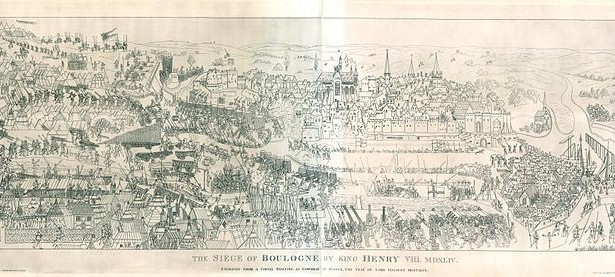
In the summer of 1544, Henry VIII invaded France with 36,000 soldiers – the largest army sent overseas by an English ruler until the reign of William III (1689-1702) – and captured the town of Boulogne and tens of thousands of acres of prime agricultural land in what was the greatest expansion of English territory on the continent since the Hundred Years War (1337-1453). Whereas medieval monarchs such as Edward III and Henry V sought to rule the French people as their rightful king, in the 1540s Henry VIII annexed the lands he had conquered to his English crown and imposed a colonial settlement on them. The conquered lands – which Henry’s soldiers entirely depopulated in the war of 1544-6 – were surveyed and leased out to English settlers, while both the common law and Henry’s Reformation were extended to the region.
While the establishment of an English colony at Boulogne was one of Henry VIII’s most significant ventures, it is rarely discussed in the vast literature on the history of his reign. In this book, I show that although occupation of Boulogne lasted for only six years, the developments which took place there make us revise our assumptions about key aspects of English history, from the nature of state violence to the development of the English – later British – Empire.
Boulogne was one of the last major state-backed English colonial ventures. While the establishment of colonies in Ireland in the mid-sixteenth century is traditionally seen as marking the beginning of the British Empire, I argue that the form of military colonisation the English employed at Boulogne set the tone for Tudor monarchy’s expansionist strategy in Ireland. Senior figures from Boulogne were sent to Ireland to implement the same colonial settlement they had imposed on France, while the high level of violence directed against civilians – which is typically thought to be unique to English actions in Ireland – was deployed widely against the civilian population of the Boulonnais. Indeed, Henry VIII’s conquest of France formed an episode of sixteenth-century ethnic cleansing which in its aims and implementation was not dissimilar from the more familiar modern examples, such as those found in the former Yugoslavia in the 1990s or, most recently, with the Myanmar government’s actions against the Rohingya.
Beyond showing that Ireland alone was not the laboratory for empire, in this book I also take issue with the view that mid-Tudor England was detaching itself from continental concerns following the break with Rome in the 1530s – a view which has re-appeared prominently in public debates on Brexit following the 2016 referendum. A study of the Boulogne conquest reminds us that Henry VIII’s attention continued to be focused strongly on continental European concerns long after his break with Rome. He wanted to be seen as a European monarch who was a major player on the continental stage.
In short, while Henry VIII’s conquest of Boulogne is largely excluded from the histories of overseas expansion it was one of the final efforts to establish English rule overseas through state resources alone – and it formed a short but significant episode in England’s imperial history.
Neil Murphy’s latest book, The Tudor Occupation of Boulogne: Conquest, Colonisation and Imperial Monarchy, 1544–1550, is available now.
Latest Comments
Have your say!